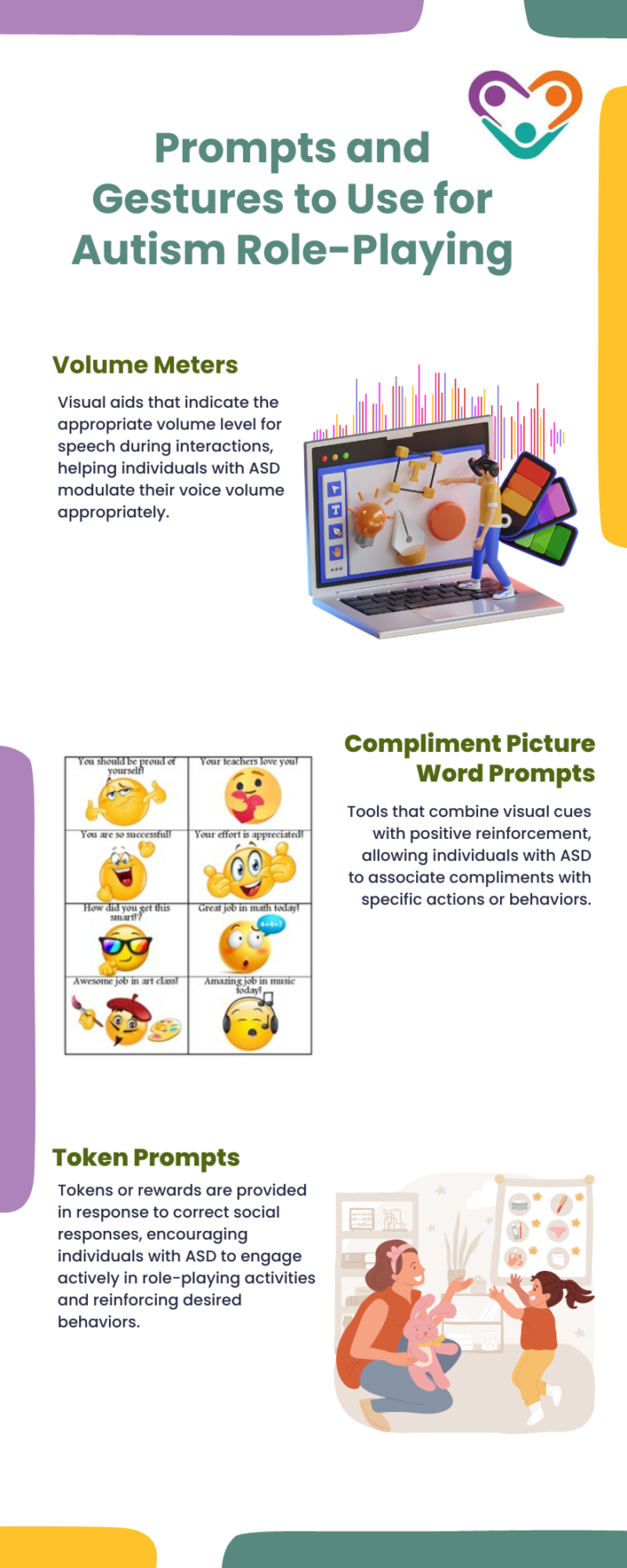
Table of Contents
Role play serves as a powerful tool for individuals with autism by offering a safe space to explore social interactions and develop essential communication skills. By engaging in imaginative scenarios, those on the autism spectrum can practice responses, understand different perspectives, and build confidence in their daily interactions.
This interactive approach not only enhances personal growth but also fosters empathy and understanding among peers and caregivers.
Through consistent practice, role play can bridge gaps, create meaningful connections, and empower individuals with autism to navigate the complexities of the social world with greater ease and assurance.
Here, we’ll look at how important role play is in the development of autistic children.
Importance and Benefits of Role-Playing
Role-playing serves as a fundamental method in social skills training for children with autism. By engaging in role-playing activities, individuals with autism can practice social interactions and communication in a safe and controlled environment.
It provides them with the opportunity to learn and understand appropriate social behaviors, responses, and cues.
Regular practice of role plays helps autistic individuals anticipate and become accustomed to social scenarios, enabling them to navigate real-life situations with increased confidence and proficiency. Through consistent exposure to role-playing exercises, individuals with autism can gradually enhance their social skills and responsiveness.
During role-playing sessions, it is beneficial for adults and therapists to model both correct and incorrect social responses.
This demonstration helps autistic individuals develop an understanding of appropriate social behaviors and learn from examples, reinforcing positive interactions and communication skills.
Meanwhile, the benefits of incorporating role-playing in ABA therapy for autistic individuals are manifold. Role-playing promotes social engagement, communication, and relationship-building skills. It encourages individuals with autism to practice turn-taking, listening, and responding appropriately in social interactions.
Effective Role-Playing Techniques
Role-playing serves as a valuable tool for enhancing social skills and communication abilities among autistic individuals. That said, two key techniques are particularly effective in the context of role-playing for individuals with autism.
Let’s look at what these techniques are.
Demonstrating Correct Responses
One of the fundamental aspects of role-playing in autism therapy is the demonstration of correct social responses. By modeling appropriate behaviors and interactions, therapists and caregivers provide individuals with autism with a clear example to follow.
Demonstrating correct responses helps to establish a framework for expected behavior and communication, allowing autistic individuals to learn and practice social skills in a structured environment.
It is beneficial for adults or therapists to demonstrate both correct and incorrect social responses during role plays. This approach helps instruct individuals with autism effectively without placing undue pressure on them to perform perfectly from the outset. By showcasing the difference between appropriate and inappropriate responses, autistic individuals can internalize social norms and expectations.
Utilizing Prompts and Gestures
Incorporating prompts and gestures into role-playing activities can significantly enhance engagement and learning outcomes for individuals with autism. Various prompts and gestures can be utilized to facilitate social skill practice and communication development.
Here are some examples:

Incorporating these prompts and gestures into role-playing sessions helps therapists and caregivers create a supportive and interactive learning environment for individuals with autism. These tools not only enhance engagement but also provide valuable visual and auditory cues that can aid in comprehension and skill acquisition.
Leveraging Video Recording
Leveraging video recording can be a strategic and valuable tool for improvement and growth when focusing on role-playing exercises for autistic individuals.
Utilizing video recording during role-playing sessions offers a multitude of advantages in the context of ABA therapy for autistic individuals. Video recording serves as a visual aid that captures the interactions and responses during role plays, allowing for detailed analysis and feedback.
This visual feedback can provide valuable insights into the individual’s progress, strengths, and areas for improvement.
Video recordings also facilitate the opportunity for caregivers, therapists, and individuals themselves to revisit and review the role-playing scenarios. By rewatching the recorded sessions, participants can reflect on their actions, behaviors, and responses, promoting self-awareness and understanding.
This reflective practice fosters a deeper comprehension of social cues, communication skills, and problem-solving strategies.
Incorporating video recording into role-playing exercises not only enhances the learning experience but also promotes engagement, motivation, and confidence in individuals with autism.
The visual element of video recording provides a tangible representation of progress and achievement, serving as a powerful motivator and reinforcement tool.

Final Thoughts
Autism role play is more than just a fun activity – it’s a powerful tool for learning and growth. By creating a safe space for individuals to practice social skills, express emotions, and navigate real-life situations, role play can help build confidence and improve communication.
The benefits are lasting and meaningful, and this makes it an essential part of supporting autistic individuals in their journey toward greater independence and self-understanding. Golden Care Therapy offers personalized support through our ABA centers in Indiana, New Jersey, New York, and Georgia. Contact us today to learn more about our services or to get started.
Sources:
- Video Modeling and Its Impact on ABA Learning - September 27, 2024
- Strategies for Teaching Turn-Taking in Autism - September 27, 2024
- Understanding Social Boundaries in Autism - September 27, 2024
